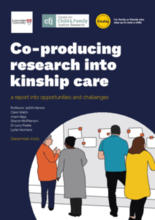

Displaying 11 - 20 of 1643
This report examines opportunities and challenges in co-producing research on kinship care, highlighting the need to involve carers as equal partners rather than treating them solely as research subjects. Drawing on a study conducted between 2022 and 2025 and accompanied by a practical toolkit, it emphasizes inclusive approaches that leverage kinship carers’ lived experiences to produce research relevant to policy and practice across all types of kinship care.
The BBC investigation reveals that more than 1,000 adopted children in the UK have returned to care in the past five years, exposing a hidden crisis in which adoptive parents struggling to support traumatised children face blame, threats, and inad
This article reports how an investigation reveals that in 2024, over 2,000 children, including 864 trafficked children (37%) and 1,501 unaccompanied asylum-seeking children (13%), disappeared from care under UK local authorities, exposing alarming
This article reports that in 2024, over 2,000 children identified as trafficked or unaccompanied asylum seekers went missing while under the care of local authorities in the UK — 37% of 2,335 trafficked children, and 13% of 11,999 lone‑child asyl
This article highlights the experiences of Greenlandic families in Denmark whose children were taken into care following parental competency tests (FKUs), which critics say are culturally biased, conducted in Danish rather than Kalaallisut, and fa
This article notes how the UK government has announced a review of the National Protocol aimed at reducing the unnecessary criminalisation of children in care and care leavers, responding to evidence that they are disproportionately cautioned or c
This article reports that Alf Dubs, a veteran Labour peer and former child refugee, strongly criticized the new asylum proposals by the Home Office under Shabana Mahmood, accusing the government of “using children as a weapon.” The proposed reform
This article describes how the Minister for Children, Disability and Equality in Ireland, Norma Foley, has announced the start of a consultation process for the forthcoming “National Policy Framework on Alternative Care” which aims to shape Irelan
This Guardian article tells the story of Craig, who became homeless at 13 after running away from a children’s home in Nottingham.
The Family Network Pilot (FNP) aims to help UK children stay safely within their extended families and prevent entry into care by providing Family Group Conferences and Family Network Support Packages. This report evaluates the pilot’s implementation, processes, and impacts across seven local authorities, using qualitative research and monitoring data analysis.


